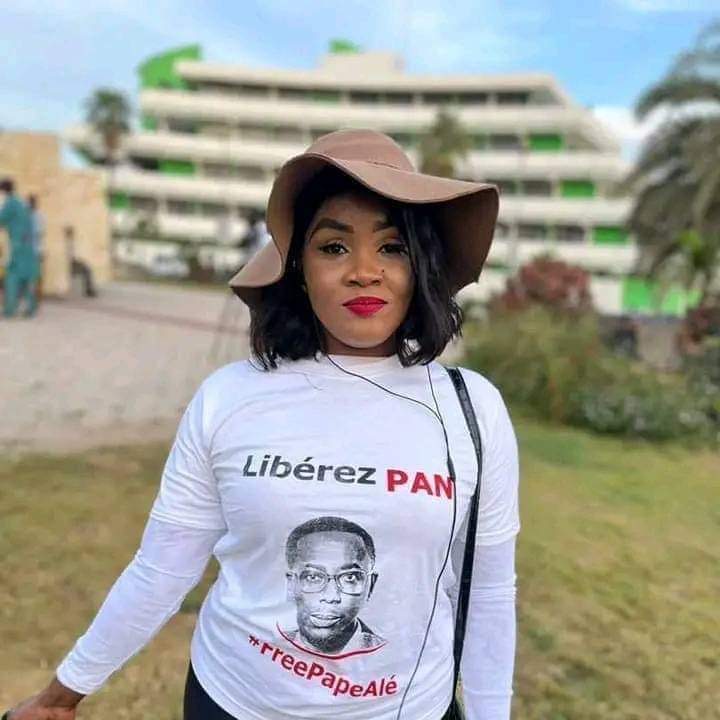On Oct. 9, five months after her imprisonment in Liberté VI women’s facility in Dakar, Senegal, journalist Maty Sarr Niang joined other prisoners in a hunger strike to press for better food, cleaner living areas and court dates, said her friend Souveibou Sagna, a journalist, in an interview with Capital News Service.
At the same time, tensions were rising between the political prisoners who were on the hunger strike and criminals. When a fight broke out Oct. 19, Niang was injured. Sagna took Niang’s oldest son to visit and help convince her to end the strike.
Niang agreed, but by then she said her lungs felt like they might explode. Medical tests determined she suffered from an ulcer in her lung. “In prison, she is sick. She suffers,” Sagna told CNS. “She can’t bear it well any longer.”
On March 12, Niang, who worked for the independent news site Kéwoulo, was freed after nearly 10 months in prison, according to Sagna. She was charged with compromising public security by illegally working as a journalist and calling for insurrection, her lawyer, Moussa Sarr, told CNS in a phone interview conducted in French. She faced up to five years in prison.
In a video posted by Senegalese activist Falla Fleur on the social media platform X, Niang is seen leaving Liberté VI and is embraced by her allies.She was granted an unconditional, provisional release as the government relaxes its measures against dissent, according to Sarr. The Senegalese government passed an amnesty law for political prisoners on March 6. Niang had become a human symbol for the quietly deteriorating condition of Senegal’s once-heralded democracy.
Her lawyer previously said Niang was likely arrested because of several messages she had posted to Facebook in support of the Senegalese opposition party, Patriots of Senegal for Work, Ethics, and Fraternity (PASTEF). Niang’s Facebook page, which is no longer public, had 31,000 followers.
The founder of PASTEF, Ousmane Sonko, was sentenced to two years in prison in June for “corrupting young people,” who are his largest base of support. His conviction led to riots in several cities, including Dakar, in which at least 23 people died.
“People were really strongly shocked by what happened in June with the violent demonstration that killed a few dozen people. It really affected a lot of people in Dakar, in Senegal,” said Guillaume Soto-Mayor, an expert on Sub-Saharan Africa at the Middle East Institute, in Washington.
In July, the government dissolved the PASTEF party.
The Embassy of Senegal in Washington declined to comment for this article.
Niang’s arrest on May 16 was viewed by experts as an effort to squash dissent as the ruling party, headed by President Macky Sall, attempted to retain control ahead of the presidential elections that were set for Feb. 25 of this year. Sall indefinitely postponed the elections on Feb. 3, leading to riots across the country that resulted in at least three dead. After a bid to push the election back until December, a court ruled that an election taking place after the end of his term in April would be unconstitutional. Sall has since announced that the elections will be held on March 25.
The arrests of journalists, the disruption of Internet services during protests and the suspension of media outlets have eroded Senegal’s longstanding global reputation as a stable democracy among West African countries, said Jonathan Rozen, a senior researcher at the international press advocacy group the Committee to Protect Journalists.
“Senegal was for a long time a beacon of democracy in the region,” Rozen said in a phone interview with CNS. “It was a place where journalists felt they could work safely, where there was an understanding that press freedom was at the core of civil society and a conception of democratic values in the country. And we can no longer say that,” he said.
In 2023, at least four journalists were arrested in Senegal, according to PressAfrik, a news website.
Situated on the coast of Western Africa, Senegal had been a rare model democracy in Africa until recently.
When he was elected in 2015, Sall said journalists would never be imprisoned under his administration, the Senegalese press reported. But in 2017, Senegal passed a new press law giving authorities the vaguely defined power to suspend a media organization if deemed a national threat, according to IFEX, a nongovernmental organization dedicated to free expression and information.
According to the U.S. State Department, several laws in Senegal now allow the government to censor the news and make it difficult to start an independent news outlet. Most public television is either directly or indirectly controlled by the ruling party.
In 2022, Pape Alé Niang, a prominent journalist and director of the news site DakarMatin, was arrested after reporting confidential information that the military may have been spying on the opposition party leader Sonko. Pape Alé Niang, unrelated to Maty Sarr Niang, was jailed on a charge of jeopardizing public security, then released in August 2023 after a hunger strike.
Guillaume Soto-Mayor, an expert on Sub-Saharan Africa at the Middle East Institute, said the Senegalese government primarily threatens independent journalists.
“It’s an entire movement of degradation of the realm of free expression that has been slowly deteriorating over the course of the past few years,” Soto-Mayor said. “Journalists have been directly attacked and imprisoned. Journalists in Senegal now have to be quite careful about what they say or don’t say.”
Kéwoulo’s director Babacar Touré said even if journalists are let out of prison, they’re often given a provisional release barring them from speaking about their arrest. Touré believes Maty Sarr Niang and other journalists were imprisoned as a scare tactic to stop people from supporting the opposition party.
With only 12 journalists at the small outlet, “It’s very, very hard and difficult for us, for me,” Touré said. “We have no financial money or things like that to help her.”

